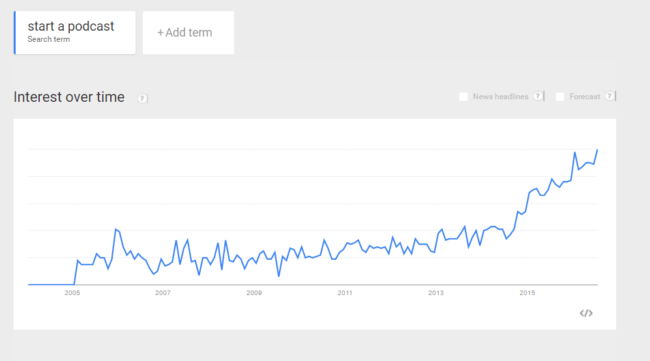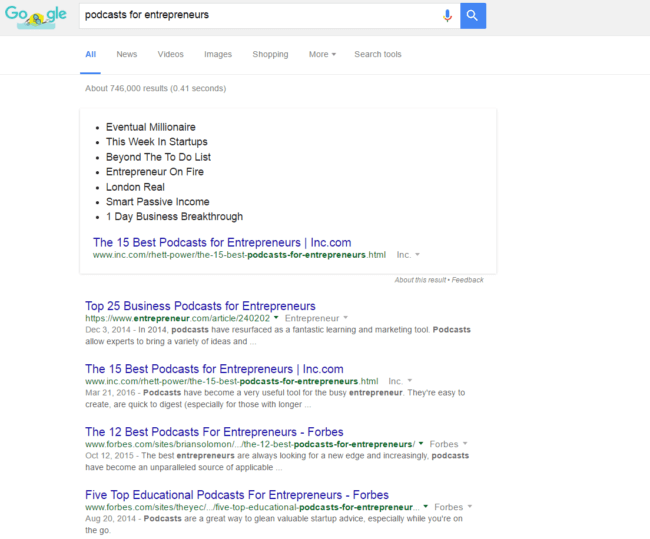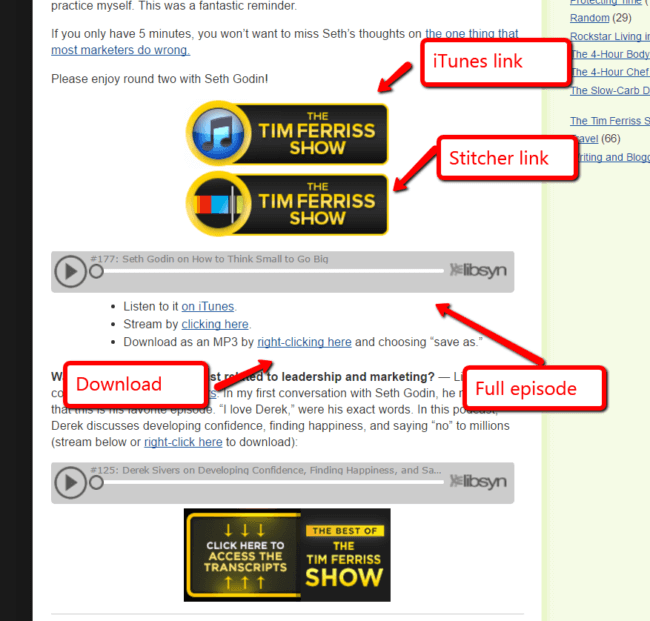Looking for a new digital agency that can accelerate the growth of your Podcast? Schedule a free marketing evaluation with our team to meet the right agencies fast. It’s fast, free, and we get it right.
Interest in podcasts and starting a podcast has gone THROUGH THE ROOF in the last few years:

Like any new or quickly rising tactic or strategy, you need to ask yourself if starting a podcast is right for you and your business. We all have our strengths and weaknesses. If you’re a writer, then write as much as you can and get really good at that craft. If you express yourself well, then maybe you should do a podcast.
So how do you know if a podcast is right for your business, and if it is then how do you start one? I asked Dan Shure of Evolving SEO, who runs the fantastic Experts On The Wire podcast, how he knew starting a podcast was right for his business. He said:
When looking to promote my business, I decided to listen to others close to me and follow my instincts – and the answer turned out to be a Podcast. [In the same day], both my employee and wife told me I was great at speaking and at home doing it. It’s important to listen to your gut. I’m not say to ignore your brain. But pretty much every time I’ve gone with instinct, it ends up working in the long run. And the beauty is it can work in unexpected ways that are even better than the ways you planned.
Dan started his podcast at the encouragement of two people who know him well, but he has kept to it because he has a passion for it. He said:
Only do a Podcast (or video show, or whatever) if it’s a strength or you hold a strong enough passion for it which means you’ll be so determined you’ll keep going and get better at it.
Another podcaster, Selena of PermissionLESS, said this about her reasons for starting her podcast:
I decided to start a podcast when I realized that the candor and discussions I could have via the podcast medium were so much more personal and relatable than when people had time to think about their answers in an interview post…
If this is you, then let’s talk about how to get started with your very own podcast.

Table of Contents
Finding the right idea
Have you ever heard this?
I’d like to start a podcast but I don’t know what’s interesting to people.
If so, you’ve likely heard this:
Only boring people get bored.
When you’re looking for ideas, whether it’s for content marketing or a podcast, you can always use available data to find what people are searching for specifically. You can use the Google Keyword Planner or SEMrush or Moz Keyword Explorer, but those won’t tell you what people find interesting. If you only go off of data, you may find that you have created something that gets some traffic or listeners but doesn’t connect with anyone. You’re another voice in the crowd.
When thinking about what to create a podcast about should you realize that it is your medium of choice, first think about what you are an expert in and what you care passionately about. If you care about backpacking, do it every weekend, and spend all of your free time planning trips, then you should maybe start the best podcast about backpacking. If you go backpacking once every three months and spend most of your time watching TV or doing a different sport, you likely should not start a podcast about backpacking. Maybe you should start one about learning how to focus your efforts on things that matter, though.
Do Market Research
I was recently having a conversation with my wife where I realized that there are likely many verticals where no podcasts exist. With the explosion of podcasting happening and expected to continue for quite a while, now is the time to launch that podcast you’ve always wanted to do.
I recommend starting at Apple’s podcast directory and browsing to your genre, then looking through to see the top podcasts and if your space is already crowded. If you’re still looking for the right idea, this is a great place to know what is popular but also competitive and thus potentially hard to break into without a budget and experience podcasting.
From there, do Google searches like [podcasts for entrepreneurs] and scan those lists to get an idea of who is out there, what they are talking about, and what could make yours stand out from the crowd:

Getting Started with Podcasting
If you’re looking to get started cheap and easy, tools exist to help you do that. Before you get going, first get comfortable hearing the sound of your own voice. Just like fear of public speaking, people without much experience tend to freeze up, speak too quickly, or get otherwise flustered their first number of times. If you are shy about recording yourself or others, get used to having the recorder around during normal everyday life. By doing this, recording will not be nearly as daunting when it comes time to actually record your first episode.
Recording
Recording is to podcasting as writing is to blogging. There are two important parts to this – the microphone you use and the recording software you use to record the episode. You can go cheap with something like the Samsung Q2 if you are just getting started, or if you don’t mind also wearing something in your ear (which is fine if you are not doing video), then the stock Apple headphones are great for getting started. If you want to go more high-end, Alex Blumberg of the Startup Podcast recommends the Audio Technica Shotgun Microphone.
Next you need to record the actual episode. If you’re starting small and just starting without worrying too much about editing, you could use the Opinion Podcasts app (iOS) to start. You can do some light editing and publish to the different places where people publish podcast episodes (like SoundCloud and iTunes). The disadvantage here, of course, is the inability to add pre-roll or post-roll audio such as a consistent introduction or conclusion to each episode.
Recording software
Some of the other popular recording tools mentioned by podcasters are:
- Call Recorder ($30, pairs nicely with Skype)
- Hindenburg Journalist ($95)
- Zencastr (a new tool in beta)
Editing
If recording a podcast is like writing the first draft of a blog post, then editing serves the same place in podcasting as it does in blogging. You can write or record your first pass, but what are the chances you got everything right on the first try?
While a good editor can make a good blog post great, editing can literally transform a podcast from the recorded sounds of someone talking into a professional, produced, easy-to-listen-to production. By adding an intro and conclusion, removing some of the “ums” and “ahs”, and helping the conversation flow instead of being choppy like normal speech, you can have yourself a professional podcast.
Editing gets tricky depending on how your audio is done. If you record in one place (via Zencastr or your recording software), then it’s relatively easy to have your different voices and conversation synced. If you use separate recorders, however, then the challenge becomes deeper. We’re not going to go into how to edit multi-track episodes here, but if you are just starting it is best to keep to one recorder to keep things simple.
The podcast editing software that everyone tends to recommend are these, in order of availability, price, and ease of use:
- GarageBand (Mac only)
- Audacity
- Adobe Audition
A good resource: How I Edit Podcasts
Publishing
Once your episode has been recorded and edited to your desired level of quality, now comes the exciting part – publishing for the world to listen.
There are a few common places to publish your podcasts depending on how you will promote your work. The most common places to publish your podcast are:
If you want to get the maximum bang for your efforts, you should make sure you cover both of the major mobile platforms (iOS and Android) via their respective stores. If you have a place on the Internet that you call your home (aka a website), then you should also use a service like SoundCloud or LibSyn so that you can publish posts with the podcast embedded on your own site.
I like the way Tim Ferriss does it on his blog (this is an episode with Seth Godin):

A good resource: How to publish your podcast to iTunes
Promotion
Selena offers some sage advice:
[T]here is a decent amount of production that goes into podcast production…so be prepared to block out time for editing, mistakes, re-recording (which has happened to me before – the software didn’t catch half of the audio) scheduling, and so on.
If you’re a marketer and practice content marketing (and I consider podcasting to be content marketing), then you’ve likely heard the adage to spend at least as long promoting your content as you do creating it. So if you’ve spent an hour creating your podcast episode, plan to spend at least an hour or two promoting it via your blog, social media, email lists, and through reaching out to others.
One great feature of the main directories like iTunes and Google Play is that they allow for subscriptions. Thus, instead of getting people to listen to every single episode via your own marketing efforts, they can be alerted when you publish a new episode. Just like an email list for a website, your listenership (is that a word? It is now!) will grow as you gain more and more subscribers to your podcast. Thus, ask people to subscribe instead of just listening.
Some of the bare minimum ways to promote your podcast (and this will be covered in a future post) are:
- Through your own blog (write a post about each episode)
- Email your email list every episode
- Publish it to your podcast subscribers on the various channels
- Be a guest on other podcasts, maybe offering co-promotion (I’ll be a guest on yours if you will be a guest on mine)
- Add your podcast to curated podcast directories
- Reach out to sites that have published best podcasts lists and get yours added. And of course, the best way to build a consistent audience is to publish consistently. Let people know what to expect and then give it to them.
Monetization
Point blank, if you’re podcasting to build your business and not building a podcast business (a business that is a podcast), don’t worry about monetization. Just like most businesses don’t do any advertising (display or affiliate) on their own blogs, why would you do it on your podcast?
Many podcast businesses do blatant advertising, where they say that the podcast is brought to you by [sponsor] and [why that sponsor is great] and [where you can go to get a special deal]. Many of these podcasts have formed direct relationships with the businesses and thus send them to a special url (eg site.com/[podcast]) so that the advertiser can track the return on their advertising investment.
As a business, there are two ways that you can “monetize” your podcast if you want to:
- Make your business the “sponsor” of the podcast. This way you build brand familiarity with your audience who may not previously know who you are and have discovered you somewhere other than through your email/blog/etc. Chase Jarvis does this with his Chase Jarvis Live podcast
- Use a company you are an affiliate for (via ShareASale or some other platform) as the sponsor, then link people to a URL on your own site where they can learn more and then click an affiliate link to go buy/sign up. You need to follow FTC disclosure guidelines, but this can be a great way to plug products you use/love and can earn some extra money from.
Have you started a podcast for your business, or looking to do so? What other questions do you have?
If you need help growing your podcast to grow your business, then you can find them here on Credo.

